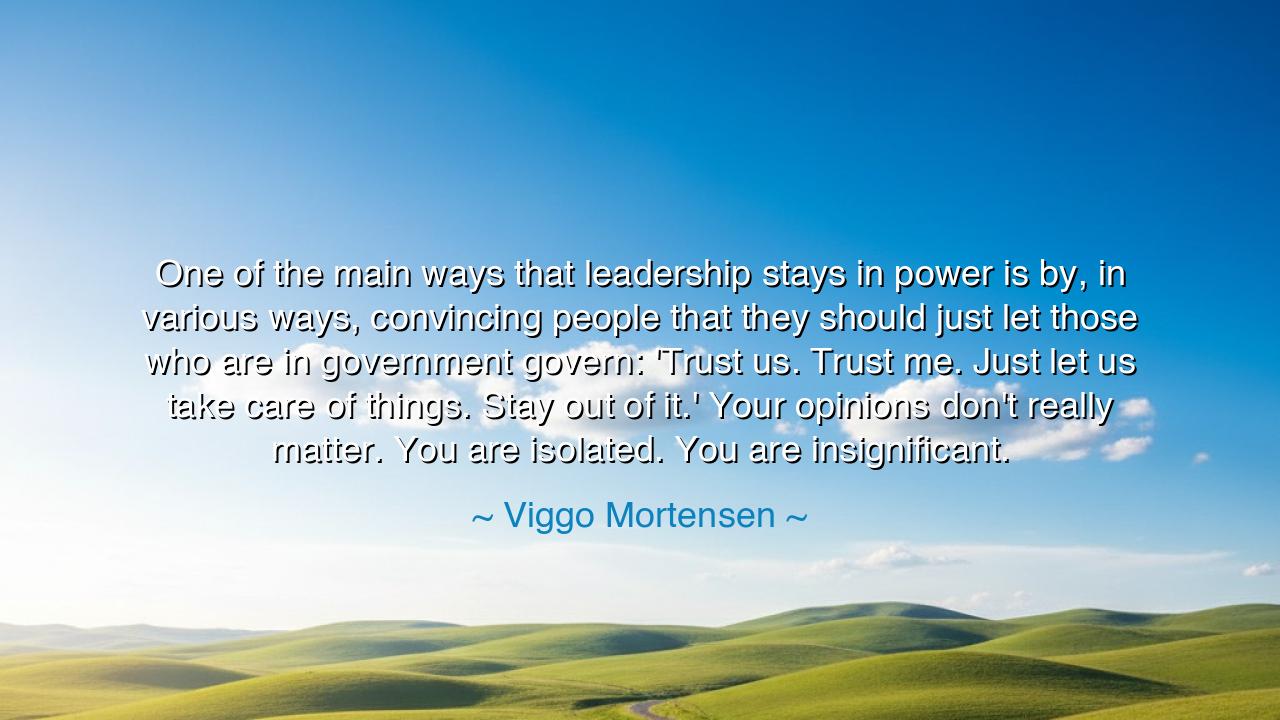
One of the main ways that leadership stays in power is by, in
One of the main ways that leadership stays in power is by, in various ways, convincing people that they should just let those who are in government govern: 'Trust us. Trust me. Just let us take care of things. Stay out of it.' Your opinions don't really matter. You are isolated. You are insignificant.






Hear the words of Viggo Mortensen, who warns with clarity: “One of the main ways that leadership stays in power is by, in various ways, convincing people that they should just let those who are in government govern: ‘Trust us. Trust me. Just let us take care of things. Stay out of it.’ Your opinions don’t really matter. You are isolated. You are insignificant.” In this saying is uncovered a timeless danger, one that has toppled empires and enslaved peoples: the silencing of the citizen, the illusion that power belongs only to the few, while the many must stand aside in quiet obedience.
For rulers throughout history have known this truth: it is not swords that secure their thrones, but silence. When the people believe they are insignificant, when they accept the lie that their opinions don’t matter, then tyranny has already won without a battle. Mortensen unmasks the weapon of apathy, the subtle chain forged not of iron but of words—“Trust us. Stay out of it.” Yet trust without accountability is blindness, and silence in the face of power is surrender.
Consider the tale of Rome, when emperors began to rule not as servants of the Senate and people, but as gods above them. The people were given bread and circuses, their voices numbed by distraction. “Stay out of it,” said the rulers, “we will govern.” And so the republic that once prized debate and participation withered into autocracy. The citizens became spectators, and the empire, though mighty in appearance, rotted from within. Mortensen’s words echo this lesson: when the people yield their voice, even the strongest nation decays.
Yet there are also shining examples of resistance. Recall the American Revolution, when colonists were told by the crown that their opinions were meaningless, that they were subjects, not citizens. But men like Thomas Paine and Patrick Henry cried out, “We are not insignificant!” and stirred the people to rise. Their defiance proved that the strength of a nation lies not in the hands of rulers alone, but in the voices of its people, united and unafraid. The chains of insignificance were broken, and from them was born a republic.
The meaning of Mortensen’s words, then, is not merely a warning but a call to vigilance. Leaders may always be tempted to consolidate power, to discourage dissent, to lull the people into quiet submission. But the true safeguard of liberty is an engaged people who remember that they are not spectators in the play of governance—they are participants, authors, and guardians of it. Democracy dies not when leaders deceive, but when citizens believe they are powerless.
The lesson for us is clear: never let yourself be convinced that your voice is too small, or your opinion too weak. Question those who rule, for questioning is the lifeblood of freedom. Speak, even if your voice trembles, for silence is the ally of tyranny. Stand with others, for unity shatters the illusion of isolation. The rulers may say, “Stay out of it,” but the wise citizen knows that to stay out is to lose all.
Practical steps must follow this wisdom. Engage in the affairs of your community. Vote, speak, write, and gather with others to seek justice. Support leaders who invite participation, not those who discourage it. Teach your children that their voices matter, so they may grow not as subjects, but as free men and women. And above all, guard against the poison of insignificance, for once it enters the heart, freedom itself begins to fade.
Thus, let Mortensen’s words be a torch in dark times: do not be silent, do not believe you are insignificant, do not “stay out of it.” For the fate of nations is not decided by kings or presidents alone, but by the countless voices of ordinary people who dare to speak, to question, and to stand. This is the ancient truth: power belongs to the people, if only they remember it.






AAdministratorAdministrator
Welcome, honored guests. Please leave a comment, we will respond soon